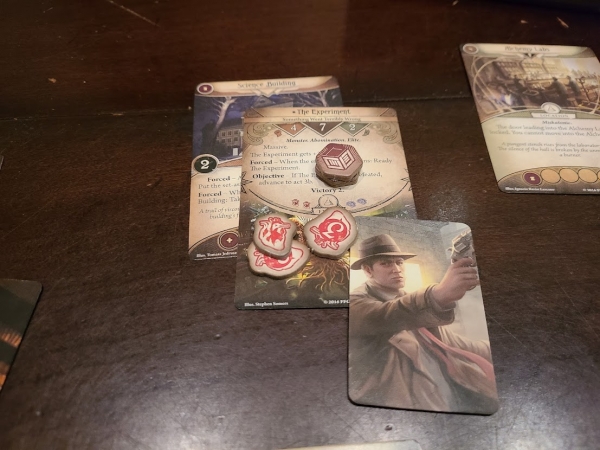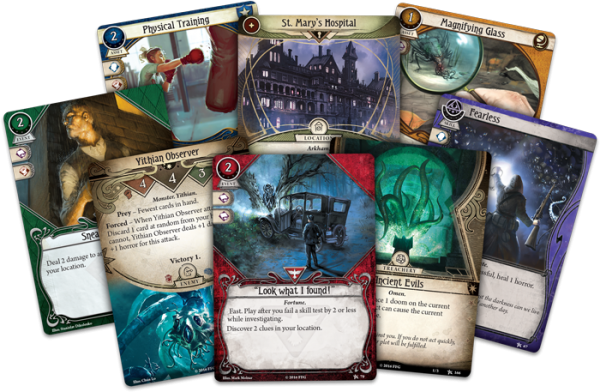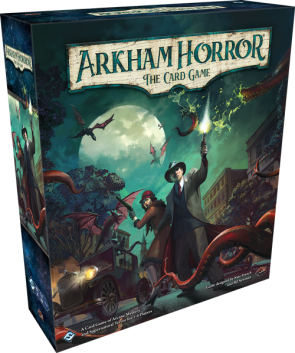Arkham Horror The Card Game by Fantasy Flight Games is the best deck construction/deck building game I have played; no small feat because I find most of the biggest card games in the genre to be completely impenetrable and intimidating. It is also probably the most difficult game to get into that I have, nevertheless, grown to like, presenting a wholly deceptive façade as a light “experience” adventure game when it is actually an exceptionally hardcore product. Arkham Horror CG a bit like a jewel locked behind multiple layers of elaborate security: security guards, electronic locks, heat sensors, the whole bit. If you can get through the tall walls standing in your way, it has an enormous amount to offer. But getting there is not easy and is, in practice, also staggeringly expensive.
By way of setup, Arkham Horror CG is more of a game engine than a set game. Each scenario asks you to manipulate the basic engine in different ways, but boils down to characters traveling between locations, taking skill checks, fighting, and gathering clues. You handle these challenges using the combination of an investigator of your choice paired with a (usually) thirty card deck composed of the assets, tricks, and skills your investigator will bring to the table. Scenarios are ordered in campaigns, and as campaigns go on you will be adding new cards from whatever sideboard of cards you happen to have.
The Wall
Before I get to the aspects Arkham Horror CG excels at, let me talk about the barriers to enjoyment it presents, because from my perspective they are varied and pretty brutal. The game expects you learn a game on the fly, losing feels like shit, the beginner product line is terrible, enjoyment requires huge buy-in, and prospective players should engage community tools to get the most out of the game. All of these criticisms come together into one baseline fact: it is extremely unfun to lose in Arkham Horror CG with a badly tuned deck, especially on first play of a scenario. Everything else flows from this.
On a purely mechanical level, I found Arkham Horror CG intimidating to play initially because of its structure. Scenarios are all different, and their rules are presented to you across a variety of different kinds of components that describe interlocking mechanisms---act, agenda, encounter, monster, and other special cards all come together to form a lattice that operates the mechanical gimmick of that scenario. But because of this, it is very hard to get a holistic picture of what is actually going to happen and how to execute those instructions on the fly while you play without breaking the rules (or the pace) horribly. My thesis about this game is that it can be a game about learning how to play a game, which can make it choppy and bewildering on first play. This makes Arkham Horror CG intimidating except for very experienced gamers.

In play, Arkham Horror CG is a game of ruthless action efficiency. The sort of action efficiency one usually associates with a Knizia or a Pax series entry. Players need to handle the encounter card “bad” they receive every turn---could be an enemy to fight, something restricting your play options, a damaging skill test, or something worse---and also make progress against whatever the scenario goal is, all in the span of three actions. In practice, most of the opposition thrown at you serves to drown your action efficiency. Enemies tie you up in engagements, preventing you from making progress against the goal until they’re dealt with. Clue retrieval is an action sink. Scenario boss enemies often have many turns worth of health, to be confronted while challenges keep piling up from encounter cards. Most importantly, if you are behind the action curve in Arkham Horror CG, even at its easiest setting, losing feels like having all of your options stolen from you and being slowly strangled while you fall farther and farther behind. In my view, this makes it a terrible adventure game. I am told people enjoy no-spoiler first plays of scenarios. I cannot imagine how or why, as coming to grips with challenges you cannot prepare for does not create exciting, dynamic, adventure gambits but rather stifling losses that could not be prepared for. Against the grain, I enjoy Arkham Horror almost exclusively on a mechanical level and consider it a strategy game first and foremost with little appreciation for its narrative or adventure qualities.
Dovetailing with losing sucking is that the core set of Arkham Horror CG is bad. Getting to a fun product requires immense investment. I quarrel much less with the thin scenario offerings in the core (just three) than the investigator deck possibilities. The player decks provided are poor, unfocused, and they do not feel very empowering to play. So not only will beginner skill be low, beginners are also equipped with poor investigators without the player card sideboard to handle challenges. And to repeat, losing with bad decks with few options in Arkham Horror CG feels like shit.
So how much more Arkham Horror CG do you need? Well, there is the horrifying rub. I would estimate that I only started having fun with the game when I had bought a full campaign cycle and the five investigator starter packs on top of a core. That put me in for… approximately two hundred dollars. There’s no way to sugar coat this: creating good player decks and therefore finally having fun with Arkham Horror requires a shitload of cards and a boatload of money.
To add insult to injury, understanding how to make decks that unlock the fun in the game is helped by engagement with the (quite lovely) online community. The Arkham Horror CG community has the amazing resource of www.arkhamdb.com, where decks can be seamlessly created, shared and inexperienced players can get insight into what good decks look like. The Arkham Cards phone and tablet app is, similarly, a jewel of an app which lets you manage decks, plugs into arkhamdb, and leads you through campaigns and records information while playing.
Beyond the Wall
So say we, despite the odds, have a huge set of cards and another campaign. We are looking in our app, perhaps at someone else’s highly liked deck, and we are reading their comments for beginners on their philosophy. Why would anyone go to this trouble? What’s there?
In short, Arkham Horror CG is a tightly designed, incredibly accessible introduction to and elaboration on deck construction and deck building. First and foremost, it is a cooperative card game which completely changes the context of constructing decks for play, reducing the stakes immensely. Your constructed deck is going up against a built scenario, with a surprisingly elegant difficulty system. This immediately nulls all of the fraught, competitive, race-to-the-best-online-deck aspect of deck construction games. Players can build their decks for campaigns and try creative things without dipping them into the crucible of typical deck or army building munchkin behavior. Even the community of Arkham CG is helped by this setup, being quite positive with no real caginess about sharing successful builds since they will not be deployed against others.

I hear you saying, though, that other CGs have been cooperative before. Lord of the Rings LCG, for example, or even its lovechild Marvel Champions. What advantage does this particular game have? To me, Arkham Horror CG’s biggest advantage (beyond a system that does not pivot strictly on ally mooks) is how the upgrade system combines with the complexity of the levers its cards can pull. The upgrade system, in and of itself, gently introduces players into deck construction. Upgrades feel great and, critically, there are not any purely wrong answers. A level 4 card is going to be better than a level 0 one, and you have a small discrete number of XP to play with after every scenario. I found that being gently introduced to deck construction via the upgrade system completely unlocked the joy of tuning and making investigators. Sornars on our forums pointed out to me that Arkham Horror CG's decks have a strong parallel to an incredibly crunchy tabletop RPG character creation and upgrade system; I would say that is exactly the appeal of the dizzying deck construction options now available. I started working with the upgrade system from prebuilt decks, and via what I learned there, branched out to tinker with the initial decks and deck concepts, something I have never felt comfortable doing before in any big card game.
The investigators themselves further support experimentation. Investigators are almost universally well designed. They feel like they are partially intended to, mechanically, introduce players into the myriad of successful strategy directions the huge corpus of cards can support. The investigators are a chance for FFG designers to provide a great roadmap of possibilities for a beginner that otherwise might not be obvious, while simultaneously creating exciting new opportunities for experienced players to use older weak or forgotten cards.
I think it is fair to say that everything else about the mechanics of Arkham Horror CG leans into the core strength: it makes deck building fast, easy, and fun. It does a great job of shortening the length between a deck idea, constructing that deck, and testing that deck idea in a scenario. Critically, decks are quite small by CCG/LCG standards, generally thirty cards, can have two copies of a card, and each character only has access to very limited card suits. Putting together an experimental deck is, therefore, straightforward and can feasibly revolve around the interplay of a simple and limited set of cards. Playing into the playful, iterative experience, individual scenarios of Arkham Horror CG are very difficult but also much shorter than a game of Arkham Horror or Eldritch Horror, realistically wrapping up in under an hour once set up. The decision-making comes so fast, and your actions are so limited and important, that there is very little faffing about before it becomes perfectly clear if you’ll be able to execute your ideas.
For me, the pleasure of playing Arkham Horror CG is in playing a challenging, taut cooperative strategy game in the shadow of wildly engaging deck construction. I cannot say that I expected the experience to be quite so unforgiving and euro-like mechanically, given what on its face looks like a pulpy game of taking risks and shooting monsters. In practice, Arkham Horror is all about playing efficiently and taking as few risks as possible, and I cannot even wrap my mind around the idea that people can successfully complete scenarios and campaigns on hard or higher difficulty. Yet despite all these positives, it is absolutely wild that this game has been successful as it has. It is still hard to ignore just how unfun the play of having a bad deck is or how much real money you will spend to get into the fun part. Nevertheless, I am grateful to have gotten stuck into Arkham Horror CG after several tries and a long time on my shelf, because it has unlocked a genre of game that I have never had any luck with.
 Games
Games How to resolve AdBlock issue?
How to resolve AdBlock issue? 





























